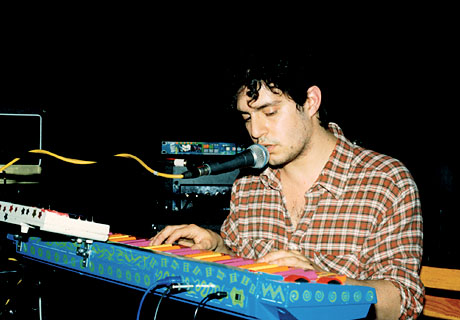By Kevan Hannah

Musician, songwriter, director, actor, playwright—Toronto’s Bob Wiseman has built a 25 year career upon finding new roles to play, crashing and bleeding into each other to create an art that is uniquely his own. It’s transformed Wiseman’s live performances into an audio-visual spectacle, backing his music with evocative, original films written and directed by the man himself. He was kind enough to spend some time talking to Stylus about his performances, which Winnipeg audiences can experience for themselves at the Ragpickers Theatre this Saturday, May 1.
Stylus: You seem to be constantly spinning as many creative plates as you can. How are things going for you these days?
Bob Wiseman: Pretty good. I wrote a play about my experiences with lawyers and the music business. A lot of that is funny, and I’m mounting that at the Uno Festival in Victoria later in May, and then at several Fringe festivals over the summer, including Winnipeg. And I just was in Europe, over the last six weeks.
Stylus: How did you branch out into writing for theatre?
BW: I’m not sure, there’s a few stories I could tell. But I guess foremost, being from Winnipeg, originally, you move to a bigger place like Toronto and it’s thrilling that there are so many arts, there’s a critical mass of people to make a lot of independent art viable and I like attending a lot of things. So I’ve always been interested in theatre. Specifically, I wrote this play because this theatre festival in Toronto called SummerWorks, and they have a music component. They asked me if I would play a party several months before the festival was going to begin, because they thought I would be one of the music people. But they were kind of charmed with the films that I have that three of them by the end of the night were like, “You know, you should just do this as a play.”
Stylus: Where did the inspiration for the play come from?
BW: There’s a few different things in my past that I thought about and the one that stuck with me as the most amusing was maybe having it to do with lawsuits and lawyers, because I’ve been in the music business a while and because I’ve seen a lot of that stuff up close. Some of it’s serious, like my first record, which was destroyed by Warner Bros. because I used the word “Pepsi” in a song that went on about how Salvador Allende was murdered in Chile in the ’70s. From that to in the ’90s, when Prince decided to become a symbol, I put out a press release that I would become Prince. I was on CNN, it went all around. I thought it would just be a joke in Toronto, but it went all around the world, and then Prince’s lawyers wrote me a letter threatening me. So all those kinds of stories I dramatized in my play. The play is called Actionable, partly because that the language that Prince’s lawyers used. “Any attempt by Mr. Wiseman to utilize our client’s valuable trademark will be actionable.”
Stylus: Your catalog of work is incredibly thick and diverse, and seems to be constantly changing and evolving across so many mediums. Outside of your play, what are you doing these days, creatively?
BW: There’s always a few things going on. The main thing I’m doing is preparing for this tour. That will bring me to the theatre above Ragpickers on May 1. And I’m working with this new sound and lighting woman named Christina and it’s nice to have someone with me to help plan the presentation of the work. I’m working on some new films for the live show, and probably in the midst of that, when I get to that in May, I’ll start to refocus on Actionable. I have, in the past, taken on too many things and I’ve disappointed people sometimes for doing that and I think I’ve learned lessons from that. As much as my bio may look thick, I try to be careful to actually be able to finish the things I say I can do. Right now, that would be to do these concerts well and to try to advance the films I’m in the midst of.
Stylus: How do you keep yourself from becoming overwhelmed with so many projects always going on?
BW: It would be great to have staff. The thing always in the back of my head is that, if I had a real big leg-up, if I had a real shot, if I came into a windfall, I wouldn’t go to Hawaii, I wouldn’t take a vacation. I would hire one or two people to help me with however many activities I’m trying to do. I would get more things done and done better if I could employ people. So I just try to take on everything I can possibly do. It’s the nature of being an artist, and trying to survive. You get involved in so many things. I think the more complex a structure is, the more likely it is to remain. I guess you could call it an observation of architecture. So, to be an independent, self-employed artist, it’s not only that it turns me on to do lots of things, but it also helps ensure my survival.
Stylus: The live show is deeply rooted in performance artistry, and seems to lean on the visual element even more than the musical one. How did your act evolve from just your run-of-the-mill concert?
BW: I think it morphed into what it is during the last ten years because I became friends with a lot of film people and a lot of comedians, and a lot of the comedians were using video in their performances. The film people were kind of far-out and charming, they would work with things like Super-8 film. It’s all just part of the fun of living in Toronto. It just got under my skin. I mean, I’m in my forties, and I looked at what I was doing on stage, just like the other ten million singer-songwriters. If you’re not established in a big way, where you’re playing theatres, then the people who come to the places you play tend to be in their twenties and tend to be interested in other artists who are also in their twenties. I found myself just trying to make sense of what I’m doing, and what I wanted to continue with.
Stylus: And the audience has reacted pretty positively to what you’ve been doing?
BW: Except for one night in Klaipeda, Lithuania. Generally I’d say that the audiences really love what I’m doing. And even in Klaipedia, Lighuania, they really loved it, there was just this one drunk guy. As soon as you put a film on, everyone’s like “Shh! Shut up, shut up, it’s a movie!” I subtitle the films, and I think people really enjoy that when I’m in foreign countries. It helps them understand the humour of what I’m doing, or the seriousness of what I’m doing. And I think they respect me trying to say these things in their language. A lot of people just go to other countries and continue to sing in English and that’s a strange thing. People encourage you to just feel comfortable about that.
Stylus: You’re still a relatively national talent. How did you end up in Europe?
BW: At the end of the last tour, I returned, to my surprise, to see that David Byrne had added four of my songs to his March playlist. That was part of what helped secure me getting a new agent for Europe. I was trying to get a more substantial agent, as a lot of those people just have blinders on for artists who are associated with a lot of money or with a new record deal. A lot of them would tell me to just go away because they were too busy. So there were four new agents that I was encouraged to approach and three of them wrote me back and were like “Yeah, sure, we would like to book you next time.” I got all my films subtitled so that everybody understands what I’m saying and gets my jokes.
Stylus: You’ve been living as an artist for well over 25 years, but you haven’t taken any significant breaks or hiatuses. Do you find it difficult, after that length of time, to keep yourself invested in the work you do?
BW: Making it original and exciting for me isn’t something that I have to work at. That’s a given. I’ve always had a relationship with creating work that’s stimulating, that turns me on, and I don’t imagine it ever would stop. The great thing in being an artist and creating work is that it allows you to address things that are upsetting emotionally. The thing that artists do, whether they’re filmmakers or dancers or musicians is that whatever they get upset about—a break-up, relationship, Stephen Harper not allowing reporters to the deaths of soldiers in Afghanistan—they create work about it. It makes them feel less impotent in a world that is often broken. For me, that’s never been something I’m concerned about losing.
Stylus: How do you stay motivated after all this time?
BW: I have to be motivated. I’m not some multimillionaire and I need to get by. But I love my work. I think that when people tell me that I look younger than I am or when they comment that I don’t get sick very much, I like to think that’s because I’m doing what I like to do.

